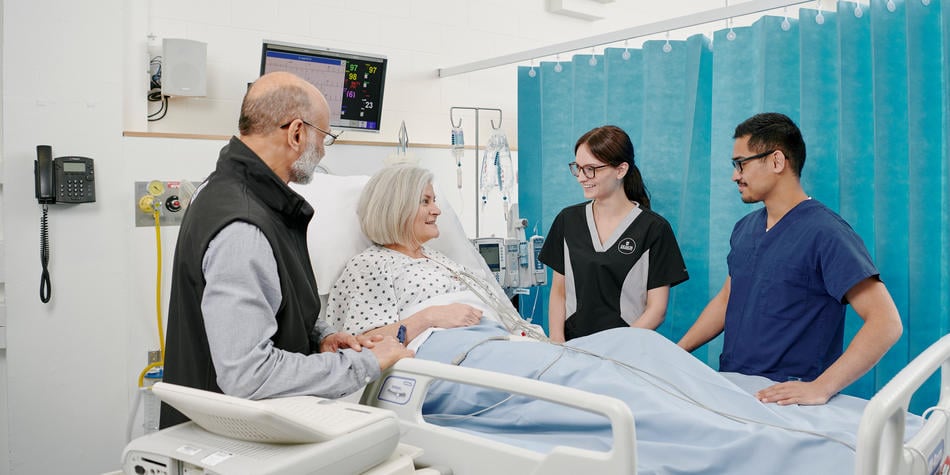Get real-world experience
Over the course of her combined Bachelor of Nursing/Bachelor of Midwifery degree, Bianca Bartholomew did nursing placements ‘pretty much everywhere in the hospital’, including in general medicine, mental health, ICU, general surgery and the renal unit – as well as in midwifery.
The Deakin graduate, who now works at Monash Medical Centre, says exposure to such a broad range of healthcare disciplines helped her understand the inner workings of hospitals and put classroom learning into real-life practice.
Nursing placement is a lot more than work experience. From checking blood pressure and administering medication to eventually managing your own patient load, it gives you a foundation from which to build sound clinical expertise for a successful nursing career.
Seeing nurses in action and how the different teams work together in the hospital to provide care – it's not really something you can imagine until you're actually doing it
Bianca Bartholomew
Bachelor of Nursing/Bachelor of Midwifery
Nurse education in practice
During student nursing placement you’ll gain clinical experience in a variety of settings including acute and sub-acute care, medical and surgical care, aged care, rehabilitation, community nursing and mental health nursing.
The settings are broad, too – you’ll work in hospitals and community health care centres in metropolitan, rural and regional areas. ‘I did a placement in a prison and one overseas on a study tour,’ says Darcy Amos, who landed a role as a paediatric nurse at the Royal Children’s Hospital after graduating from Deakin’s Bachelor of Nursing.
And there’s no waiting around when it comes to nursing placement. You’ll do your first rotation in Trimester 1 of your Bachelor of Nursing and undertake placement during every trimester of the course, racking up more than 800 hours by the time you graduate.
‘We had about two nursing placements a year, and throughout the years they got longer,’ Darcy says. ‘Our first placement was five days, whereas our last placement was a five-week placement at one hospital.’
Learning step by step
There’s no need to worry about being thrown in the deep end straight away, says James McInerney, a Deakin alumnus and graduate nurse at University Hospital Geelong. ‘We started off taking patients’ vital signs and blood pressure, and helping them with activities for daily living,’ he says.
‘At the end of first year and in second year you start doing more focused patient assessments and supervised medication rounds. You also start to interact with multidisciplinary teams of allied health professionals, doctors and other nurses.’
As you progress through the course, you’ll take on heavier and more complex patient loads. ‘At the end of first year you take on one patient, and by the end of third year you're taking on three to four patients,’ James says.
It’s a similar story in midwifery, says Bianca. ‘First year placement was a lot of observation, and as you progress further in the course, you’re able to deliver babies on your own under supervision.’
I don't think you could start work as a nurse without having worked in a hospital or having seen how every day works.
Darcy Amos
Bachelor of Nursing
Kickstarting your nursing career
On top of clinical learnings, you’ll also hone practical, boots-on-the-ground skills during nursing placement and gain a unique perspective on the working life of a nurse.
For Bianca, it was adjusting to the demands of shift work – ‘it's hard on the body and easing in helps prepare you for the rest of your career’ – and learning to care for patients for whom English isn’t a first language. ‘Being able to communicate with people in a different way to make sure you're meeting their needs is an invaluable skill,’ she says.
Darcy says observing time management strategies of experienced nurses helped her start her graduate role with confidence. ‘The thing that stood out to me was how often a nurse will get interrupted during their day – there’s so many small things that just pop up on top of remembering to give medications, top up IV fluids and communication with doctors,’ she says.
‘I saw how some nurses write everything down, some use a time planner, and some are just really good at keeping stuff in their head.'
To get the most out of nursing placement, ‘it's about attending 100% and giving it your best shot,’ James says. ‘The more you put into it, the more the opportunities that come out of it.’
Gain hands-on clinical experience in a variety of healthcare settings with Deakin’s Bachelor of Nursing.

